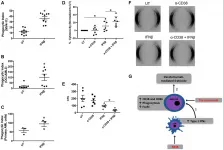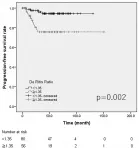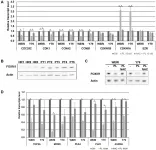INFORMATION:
The study is entitled 'The Trans-Ancestral Genomic Architecture of Glycemic Traits', and is published in Nature Genetics.
Ethnic diversity helps identify more genomic regions linked to diabetes-related traits
By including multi-ethnic participants, a largescale genetic study has identified more regions of the genome linked to type 2 diabetes-related traits than if the research had been conducted in Europeans alone.
2021-05-31
(Press-News.org) By including multi-ethnic participants, a largescale genetic study has identified more regions of the genome linked to type 2 diabetes-related traits than if the research had been conducted in Europeans alone.
The international MAGIC collaboration, made up of more than 400 global academics, conducted a genome-wide association meta-analysis led by the University of Exeter. Now published in Nature Genetics, their findings demonstrate that expanding research into different ancestries yields more and better results, as well as ultimately benefitting global patient care.
Up to now, nearly 87 per cent of genomic research of this type has been conducted in Europeans. This means that the way these findings are implemented may not optimally benefit people from non-European ancestries.
The team analysed data across a wide range of cohorts, encompassing more than 280,000 people without diabetes. Researchers looked at glycaemic traits, which are used to diagnose diabetes and monitor sugar and insulin levels in the blood.
The researchers incorporated 30 percent of the overall cohort with individuals of East Asian, Hispanic, African-American, South Asian and sub-Saharan African origin. By doing so, they discovered 24 more loci - or regions of the genome -linked to glycaemic traits than if they had conducted the research in Europeans alone.
Professor Inês Barroso, of the University of Exeter, who led the research, said: "Type 2 diabetes is an increasingly huge global health challenge- with most of the biggest increases occurring outside of Europe. While there are a lot of shared genetic factors between different countries and cultures, our research tells us that they do differ, in ways that we need to understand. It's critical to ensuring we can deliver a precision diabetes medicine approach that optimises treatment and care for everyone."
First author Dr Ji Chen, of the University of Exeter, said: "We discovered 24 additional regions of the genome by including cohorts which were more ethnically diverse than we would have done if we'd restricted our work to Europeans. Beyond the moral arguments for ensuring research is reflective of global populations, our work demonstrates that this approach generates better results."
The team found that though some loci were not detected in all ancestries, they were still useful to capture information about the glycaemic trait in that ancestry. Co-author Cassandra Spracklen, Assistant Professor at the University of Massachusetts-Amherst, said: "Our findings matter because we're moving towards using genetic scores to weigh up a person's risk of diabetes. We know that scores developed exclusively in individuals of one ancestry don't work well in people of a different ancestry. This is important as increasingly healthcare is moving towards a more precise approach. Failing to account for genetic variation according to ancestry will impact our ability to accurately diagnose diabetes."
ELSE PRESS RELEASES FROM THIS DATE:
Medical AI models rely on 'shortcuts' that could lead to misdiagnosis of COVID-19
2021-05-31
Artificial intelligence promises to be a powerful tool for improving the speed and accuracy of medical decision-making to improve patient outcomes. From diagnosing disease, to personalizing treatment, to predicting complications from surgery, AI could become as integral to patient care in the future as imaging and laboratory tests are today.
But as University of Washington researchers discovered, AI models -- like humans -- have a tendency to look for shortcuts. In the case of AI-assisted disease detection, these shortcuts could lead to diagnostic errors if deployed in clinical settings.
In a new paper published May 31 in Nature Machine Intelligence, ...
Isolating an elusive missing link
2021-05-31
The Water Oxidation Reaction (WOR) is one of the most important reactions on the planet since it is the source of nearly all the atmosphere's oxygen. Understanding its intricacies can hold the key to improve the efficiency of the reaction. Unfortunately, the reaction's mechanisms are complex and the intermediates highly unstable, thus making their isolation and characterisation extremely challenging. To overcome this, scientists are using molecular catalysts as models to understand the fundamental aspects of water oxidation - particularly the oxygen-oxygen bond-forming reaction.
For the first time, scientists in ICIQ's ...
Global warming already responsible for one in three heat-related deaths
2021-05-31
Between 1991 and 2018, more than a third of all deaths in which heat played a role were attributable to human-induced global warming, according to a new article in Nature Climate Change.
The study, the largest of its kind, was led by the London School of Hygiene & Tropical Medicine (LSHTM) and the University of Bern within the Multi-Country Multi-City (MCC) Collaborative Research Network. Using data from 732 locations in 43 countries around the world it shows for the first time the actual contribution of man-made climate change in increasing mortality risks due to heat.
Overall, ...
Scientists discover a new genetic form of ALS in children
2021-05-31
In a study of 11 medical-mystery patients, an international team of researchers led by scientists at the National Institutes of Health and the Uniformed Services University (USU) discovered a new and unique form of amyotrophic lateral sclerosis (ALS). Unlike most cases of ALS, the disease began attacking these patients during childhood, worsened more slowly than usual, and was linked to a gene, called SPTLC1, that is part of the body's fat production system. Preliminary results suggested that genetically silencing SPTLC1 activity would be an effective strategy for combating this type of ALS.
"ALS is a paralyzing ...
Lundquist investigators in global study expanding genomic research of different ancestries
2021-05-31
LOS ANGELES (May 31, 2021) -- Today The Lundquist Institute announced that its investigators contributed data from several studies, including data on Hispanics, African-Americans and East Asians, to the international MAGIC collaboration, composed of more than 400 global academics, who conducted a genome-wide association meta-analysis led by the University of Exeter. Now published in Nature Genetics, their findings demonstrate that expanding research into different ancestries yields more and better results, as well as ultimately benefitting global patient care. Up to now nearly 87 percent of genomic research of this type has been conducted in Europeans. ...
The price is right: Modeling economic growth in a zero-emission society
2021-05-31
Pollution from manufacturing is now widespread, affecting all regions in the world, with serious ecological, economic, and political consequences. Heightened public concern and scrutiny have led to numerous governments considering policies that aim to lower pollution and improve environmental qualities. Inter-governmental agreements such as the Paris Agreement and the United Nations' Sustainable Development Goals all focus on lowering emissions of pollution. Specifically, they aim to achieve a "zero-emission society," which means that pollution is cleaned up as it is produced, while also reducing pollution (This idea of dealing with pollution is referred to as the "kindergarten rule.")
Of course, any efforts to achieve this ...
Beer byproduct mixed with manure proves an excellent pesticide
2021-05-31
The use of many chemical fumigants in agriculture have been demonstrated to be harmful to human health and the environment and therefore banned from use.
Now, in an effort to reduce waste from the agricultural industry and reduce the amounts of harmful chemicals used, researchers have investigated using organic byproducts from beer production and farming as a potential method to disinfest soils, preserve healthy soil microorganisms and increase crop yields.
In this study published to Frontiers in Sustainable Food Systems, researchers from the Neiker Basque Institute for Agricultural Research and Development in Spain investigated using agricultural by-products rapeseed cake and beer bagasse (spent beer grains), along with fresh cow manure as two organic biodisinfestation ...
Oncotarget: Activation of plasmacytoid dendritic cells promotes AML-cell fratricide
2021-05-31
Oncotarget published "Activation of plasmacytoid dendritic cells promotes AML-cell fratricide" which reported that Interferons have been previously shown to aid in the clearance of AML cells. Type I interferons are produced primarily by plasmacytoid dendritic cells. However, these cells exist in a quiescent state in AML.
In addition, the authors showed increased expression of the immune-stimulatory receptor CD40. Then they next tested whether IFNβ would influence antibody-mediated fratricide among AML cells, as our recent work showed that AML cells could undergo cell-to cell killing in the presence of the CD38 antibody daratumumab.
These Oncotarget findings suggest that the tolerogenic phenotype ...
Oncotarget: Progression in high-risk non-muscle invasive bladder cancer
2021-05-31
Oncotarget published "A higher De Ritis ratio (AST/ALT) is a risk factor for progression in high-risk non-muscle invasive bladder cancer" which reported that a recent study revealed that a high De Ritis ratio was a risk factor in some solid malignancies.
This Oncotarget study examined the importance of the De Ritis ratio as a prognostic marker in high-risk NMIBC.
This Oncotarget study examined the importance of the De Ritis ratio as a prognostic marker in high-risk NMIBC
Among these patients, 32 patients developed recurrent disease and 15 patients showed progression.
A multivariate analysis revealed that non-BCG treatment was an independent risk factor ...
Oncotarget: Piperlongumine promotes death of retinoblastoma cancer cells
2021-05-31
Oncotarget published "Piperlongumine promotes death of retinoblastoma cancer cells" which reported that while retinoblastoma initiation is triggered by the inactivation of both alleles of the retinoblastoma tumor suppressor gene in the developing retina, tumor progression requires additional epigenetic changes, retinoblastoma genomes being quite stable.
In this report, the authors analyzed the pro-death effect of piperlongumine, a natural compound isolated from Piper longum L., on two human retinoblastoma cell lines, WERI-Rb and Y79. The effects of PL on cell proliferation, cell death and cell cycle were investigated.
PL effectively inhibited cell growth, impacted ...
LAST 30 PRESS RELEASES:
Scientists identify smooth regional trends in fruit fly survival strategies
Antipathy toward snakes? Your parents likely talked you into that at an early age
Sylvester Cancer Tip Sheet for Feb. 2026
Online exposure to medical misinformation concentrated among older adults
Telehealth improves access to genetic services for adult survivors of childhood cancers
Outdated mortality benchmarks risk missing early signs of famine and delay recognizing mass starvation
Newly discovered bacterium converts carbon dioxide into chemicals using electricity
Flipping and reversing mini-proteins could improve disease treatment
Scientists reveal major hidden source of atmospheric nitrogen pollution in fragile lake basin
Biochar emerges as a powerful tool for soil carbon neutrality and climate mitigation
Tiny cell messengers show big promise for safer protein and gene delivery
AMS releases statement regarding the decision to rescind EPA’s 2009 Endangerment Finding
Parents’ alcohol and drug use influences their children’s consumption, research shows
Modular assembly of chiral nitrogen-bridged rings achieved by palladium-catalyzed diastereoselective and enantioselective cascade cyclization reactions
Promoting civic engagement
AMS Science Preview: Hurricane slowdown, school snow days
Deforestation in the Amazon raises the surface temperature by 3 °C during the dry season
Model more accurately maps the impact of frost on corn crops
How did humans develop sharp vision? Lab-grown retinas show likely answer
Sour grapes? Taste, experience of sour foods depends on individual consumer
At AAAS, professor Krystal Tsosie argues the future of science must be Indigenous-led
From the lab to the living room: Decoding Parkinson’s patients movements in the real world
Research advances in porous materials, as highlighted in the 2025 Nobel Prize in Chemistry
Sally C. Morton, executive vice president of ASU Knowledge Enterprise, presents a bold and practical framework for moving research from discovery to real-world impact
Biochemical parameters in patients with diabetic nephropathy versus individuals with diabetes alone, non-diabetic nephropathy, and healthy controls
Muscular strength and mortality in women ages 63 to 99
Adolescent and young adult requests for medication abortion through online telemedicine
Researchers want a better whiff of plant-based proteins
Pioneering a new generation of lithium battery cathode materials
A Pitt-Johnstown professor found syntax in the warbling duets of wild parrots
[Press-News.org] Ethnic diversity helps identify more genomic regions linked to diabetes-related traitsBy including multi-ethnic participants, a largescale genetic study has identified more regions of the genome linked to type 2 diabetes-related traits than if the research had been conducted in Europeans alone.






